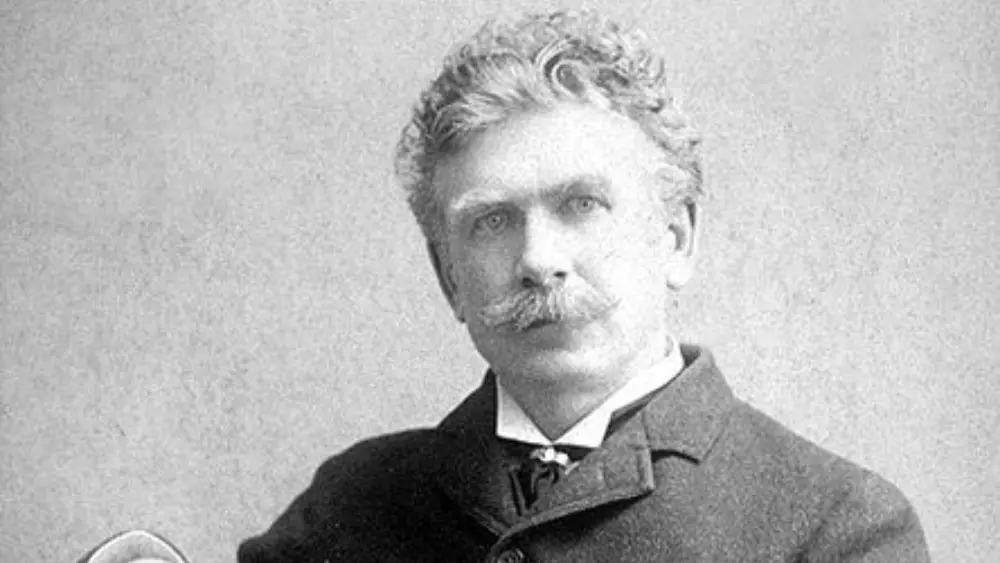Renowned for his reflections on war and human behavior, Ambrose Bierce is an esteemed American journalist, satirist, and writer. Born on June 24, 1842, in Ohio, Bierce’s life reflected incisive wit, skepticism, and keen observation of the darker human aspects.
Early Life and Military Service
Ohio-born Ambrose Bierce, shaped by his American Midwest upbringing, was profoundly influenced by his early life experiences. His regional upbringing shaped his literary works and worldview, influenced by the distinct cultural and social dynamics of the area. Enlisting in the Union Army during the Civil War defined Bierce’s life, setting the course for his future. Serving with distinction, he joined key battles like Shiloh and Chickamauga, witnessing the grim realities that inspired his future writings, which included many inspirational military stories.
Bierce’s service shaped his views on conflict, fostering profound insights into the complexities and realities of war and humanity. His battlefield experiences inspired renowned works, portraying war’s brutality and disillusionment with unflinching honesty and introspective insight. Bierce’s early life and military service shaped his emergence as a prominent writer reflecting the harsh realities of human nature.
Ambrose Bierce: Journalism and Satire
Post-Civil War, Ambrose Bierce excelled in journalism, renowned for his sharp wit and insightful satirical commentary. Renowned for sharp critique, Bierce dissected human nature, challenging norms and exposing hypocrisies with biting social criticism in literature. Via editorials, Bierce fearlessly tackled social issues, using satire to provoke reflection and confronting prevalent political problems of his time.
Bierce’s sharp wit established him as a pioneering voice in satirical literature, leaving a lasting impact on American literary tradition. His keen insight skewered human absurdities, solidifying his bold legacy and resonating with audiences seeking critical introspection and social commentary.
Short Stories and Supernatural Fiction
Ambrose Bierce’s distinctive repertoire delved into the macabre and mysterious realms through his short stories and supernatural fiction. Fascinated by human darkness, Bierce’s tales probed the psyche, exploring psychological terror, existential dread, and supernatural ambiguity. Bierce’s evocative storytelling blurred reality, prompting contemplation of enigmatic forces beyond conventional understanding and captivating readers with masterful prose.
Bierce’s macabre tales showcased his prowess, solidifying his reputation as a pioneer in the genre of speculative fiction. With unease and foreboding, Bierce’s works captured the human experience, urging readers to confront fears and contemplate life’s mysteries. Bierce’s supernatural legacy resonates, inspiring subsequent writers to explore the human condition through the lens of the uncanny.
Ambrose Bierce: Reflections on the Civil War
Bierce’s Civil War experiences infused his works with poignant introspection, delving into human conflict and the moral ambiguities of war. From battlefield horrors, Bierce’s writings grappled with the toll of warfare, offering profound insights into human violence and suffering. Bierce’s narratives urged readers to confront war’s realities, reflecting on its impact, leaving a lasting impression of conflict’s enduring scars.
Bierce’s introspective depiction of the Civil War in his works offers poignant testimony to soldiers’ experiences and enduring war legacies. His nuanced portrayal of warfare’s psychological complexities and unflinching depictions cement his status as a compelling literary figure.
The Devil’s Dictionary
“The Devil’s Dictionary,” a pinnacle of Bierce’s satire and wit, stands as a testament to his literary mastery.
The satirical collection offered biting commentary on contemporary society, serving as a scathing critique of societal norms and conventions. Bierce’s insightful definitions exposed human contradictions, challenging readers to confront the absurd and paradoxical nature of human behavior. Through clever wordplay and incisive observations, Bierce’s work entertains and compels readers to reflect on the human condition’s inherent ironies.
“The Devil’s Dictionary” showcased Bierce’s humor as a vehicle for social commentary, encouraging readers to reexamine their assumptions and perceptions. The lexicon’s thought-provoking definitions left a lasting impression, inspiring generations of satirists to expose the follies of contemporary society. Bierce’s legacy as a master of satire was firmly cemented by the enduring impact of “The Devil’s Dictionary,” which continues to resonate with audiences, prompting reflection and introspection on the enduring complexities of human behavior and societal norms.
Ambrose Bierce: Disappearance and Legacy
Ambrose Bierce’s mysterious disappearance in Mexico in 1913 has added an air of intrigue and mystique to his already enigmatic persona, contributing to the enduring fascination with his life and literary contributions. Despite various theories surrounding his fate, the circumstances of his final days remain uncertain, lending an aura of mystery to the legacy of the acclaimed author and satirist. Bierce’s enigmatic disappearance is a poignant reflection of the profound complexities and uncertainties that often define the human experience. This prompted speculation and contemplation about the enduring impact of his life and work.
Bierce’s literary legacy, characterized by its incisive wit and piercing social commentary, continues to resonate with audiences, affirming his enduring influence on the landscape of American letters. From his poignant reflections on the Civil War to his scathing critiques of contemporary society, Bierce’s works remain a testament to the enduring power of literature to provoke thought and inspire critical introspection. Through his writings, Bierce challenged readers to confront the darker facets of human nature and the complexities of the human condition, leaving behind a literary legacy that continues to stimulate intellectual discourse and cultural exploration.
Literary Influence and Cultural Impact
Ambrose Bierce’s significant contributions to American literature have left a lasting impact, inspiring generations of writers to delve into the darker and more complex dimensions of the human experience. His mastery of satire, evident in works such as “The Devil’s Dictionary,” has served as a touchstone for satirists and humorists, inspiring subsequent generations to use wit and humor as a means of social critique and commentary. Bierce’s exploration of the psychological effects of war and violence, as exemplified in his poignant Civil War reflections and macabre fiction, has also left an enduring legacy, prompting writers to delve into the complexities of trauma, human conflict, and the existential dread that often accompanies such experiences.
Bierce’s lasting cultural impact is evident in the continued resonance of his themes and motifs in contemporary literature, as well as in popular culture. From his unflinching examination of the human psyche to his keen insights into the absurdities of human behavior, Bierce’s works have continued to provoke thought and stimulate critical engagement with the complexities of the human condition. Through his unique literary voice and uncompromising exploration of the human experience, Bierce has solidified his place as a seminal figure in American letters, whose contributions continue to inspire and challenge writers to confront the intricacies of human nature and society with depth and nuance.

Ambrose Bierce: Exploration of Human Psychology
Ambrose Bierce’s work delves into human psychology, exploring its complexities with unflinching honesty and introspection. Bierce grappled with existential dilemmas, inviting readers to contemplate the intricacies of human behavior and desires. His nuanced portrayals compel readers to confront the intricacies of the human psyche and the deeper layers of consciousness.
Furthermore, Bierce’s exploration of human psychology resonates, catalyzing critical introspection and contemplation of fundamental aspects of human existence. Bierce’s writings probe human nature, offering a profound journey into the depths of the human psyche and existential challenges.










